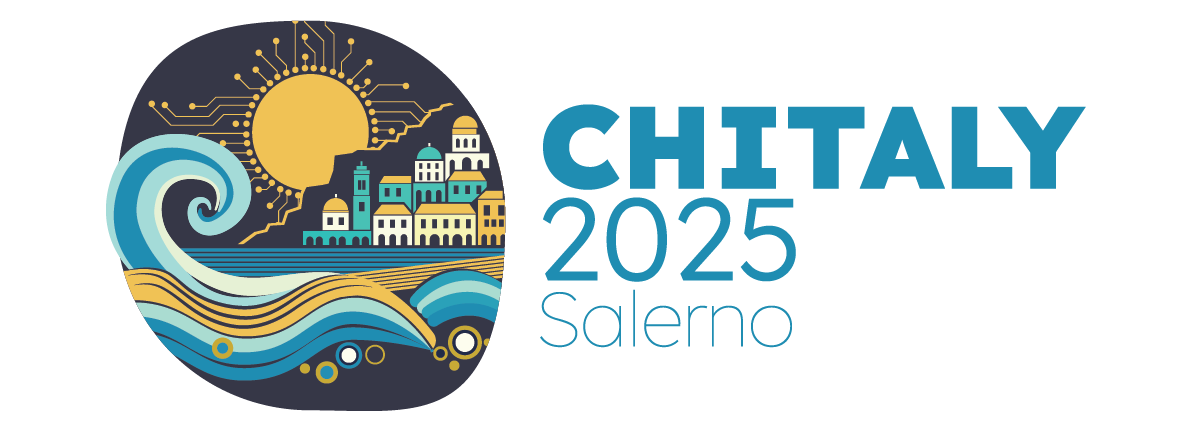Call for WORKSHOPs
The theme of the 16th Biannual Conference of the Italian SIGCHI Chapter (CHItaly 2025) is “Technologies and Methodologies of Human-Computer Interaction in the Third Millennium”. It invites us to reflect on how technological advances continue to redefine our interactions with the digital world.
Over the last two decades, the field of Human-Computer Interaction (HCI) has evolved rapidly, adapting to innovations that have transformed everyday life. Integrating Artificial Intelligence, Augmented and Virtual Reality, Robotics, voice interfaces, wearable devices, and the Internet of Things has brought HCI to the forefront of scientific inquiry, offering novel possibilities and complex challenges. These technologies are not only changing how we use digital systems but also influencing the ways we think, learn, communicate, and interact on a personal, social, and organizational level.
This year’s conference aims to inspire a comprehensive dialogue on how these technologies are reshaping the landscape of HCI and redefining the boundaries of human capabilities. Participants will be invited to engage with questions surrounding ethical implications, accessibility, inclusivity, user experience, and the sustainability of emerging technologies. The theme encourages contributors to share insights on methodologies that adapt to these changes, from user-centred design practices to innovative evaluation methods for complex, adaptive systems.
We invite submissions of workshops that contribute to the field of Human-Computer Interaction (HCI).
Workshop Deadlines*
Workshop Proposal
Submission: March 15, 2025 EXTENDED to March 22, 2025
Review notification: April 1, 2025
Initial Camera-ready: July 31, 2025
* Please, note that all deadlines follow the Anywhere on Earth (AoE) time zone, meaning submissions are accepted until the end of day D in AoE.
Workshop Proposal
Workshop proposals will be evaluated based on quality criteria, including their relevance to CHItaly 2025, their potential to attract high-quality contributions, and the robustness of their review processes.
Structure of the proposal
Workshop proposals should be structured as follows:
- Workshop Title
- Workshop Acronym (if applicable)
- Workshop Edition: If not the first edition, include previous venues, number of attendees, and links to past websites
- Organizers: List of organizers with brief bios and the main contact person
- Motivation and Objectives: Rationale and goals of the workshop
- Topics: List of relevant topics the workshop will address
- Target Audience and Expected Attendance: Define the intended audience and anticipated number of participants
- Paper Review Process (if applicable): Outline the strategy for collecting contributions (e.g., using online conference management systems or email submissions to workshop chairs), minimum number of reviews, etc.
- Workshop Format: Describe the intended structure, such as paper presentations, discussions, group work, etc.
- Dedicated Proceedings (if applicable): Specify paper types, review process, and publication venue (e.g., Journal special issue, CEUR-WS)
- Tentative Program Committee (PC) List
Submission Guidelines and Review Process
Workshop proposals should be submitted in PDF format via Easy Chair, selecting the “Workshop Proposals” track. No specific template is required.
Submissions from both researchers and industry practitioners are encouraged. We suggest involving organizers from multiple institutions to provide diverse perspectives on the workshop topic. Proposals for workshops with innovative formats that can attract a variety of contributions and foster dynamic interactions are particularly welcome.
Organizers of accepted workshops will create a dedicated website featuring the call for papers and comprehensive details about the workshop’s organization and timeline. They will also manage their own publicity and review processes.
A paper summarizing each workshop will be included in the main conference proceedings. Submission deadlines, format, and specific requirements for these summaries will be provided later.
* Select the “Workshop Proposals” track



